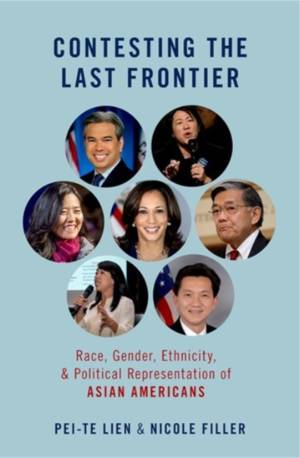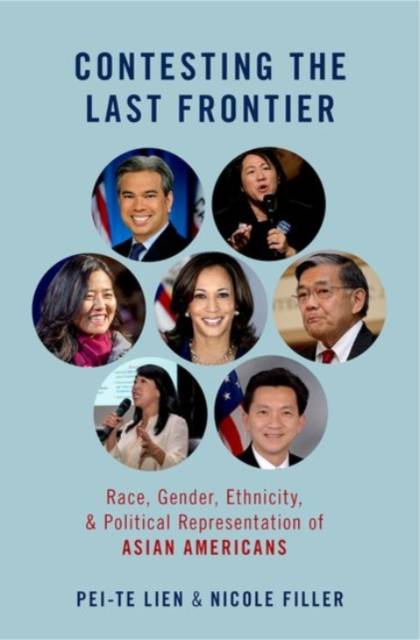
- Retrait gratuit dans votre magasin Club
- 7.000.000 titres dans notre catalogue
- Payer en toute sécurité
- Toujours un magasin près de chez vous
- Retrait gratuit dans votre magasin Club
- 7.000.000 titres dans notre catalogue
- Payer en toute sécurité
- Toujours un magasin près de chez vous
Contesting the Last Frontier
Race, Gender, Ethnicity, and Political Representation of Asian Americans
Pei-Te Lien, Nicole Filler
Livre relié | Anglais
103,45 €
+ 206 points
Format
Description
Women of color, including Asian Pacific American (APA) women, have made considerable inroads into elective office in the United States in recent years; in fact, their numbers have grown more rapidly than those of white women. Nonetheless, focusing only on success stories gives the false
impression that racism, sexism, and other forms of oppression are not barriers for APA candidates to public office. It also detracts attention from the persistent and severe under-representation of all women and nonwhite men in elective office in the United States. In Contesting the Last Frontier, Pei-te Lien and Nicole Filler examine the scope and significance of the rise of Asian Pacific Americans in US elective office over the past half-century. To help interpret the complex experiences of these political women and men situated at the intersection of race,
gender, and other dimensions of marginalization, Lien and Filler adopt an intersectionality framework that puts women of color at the center of their analysis. They also draw on their own original dataset of APA electoral participation over the past 70 years, as well as in-depth interviews with
elected officials. They examine APA candidates' trajectories to office, their divergent patterns of political socialization, the barriers and opportunities they face on the campaign trail, and how these elected officials enact their roles as representatives at local, state, and federal levels of
government. In turn, they counter various tropes, including the model minority myth that suggests that Asian Americans have attained a level of success in education, work, and politics that precludes attention to racial discrimination. Importantly, the book also provides a look into how APA
elected officials of various origins strive to serve the interests of the rapidly expanding and majority-immigrant population, especially those disadvantaged by the intersections of gender, ethnicity, and nativity. Ambitious and comprehensive, Contesting the Last Frontier fills an important gap in
American electoral history and uncovers the lived experiences of APA women and men on the campaign trail and in elective office.
impression that racism, sexism, and other forms of oppression are not barriers for APA candidates to public office. It also detracts attention from the persistent and severe under-representation of all women and nonwhite men in elective office in the United States. In Contesting the Last Frontier, Pei-te Lien and Nicole Filler examine the scope and significance of the rise of Asian Pacific Americans in US elective office over the past half-century. To help interpret the complex experiences of these political women and men situated at the intersection of race,
gender, and other dimensions of marginalization, Lien and Filler adopt an intersectionality framework that puts women of color at the center of their analysis. They also draw on their own original dataset of APA electoral participation over the past 70 years, as well as in-depth interviews with
elected officials. They examine APA candidates' trajectories to office, their divergent patterns of political socialization, the barriers and opportunities they face on the campaign trail, and how these elected officials enact their roles as representatives at local, state, and federal levels of
government. In turn, they counter various tropes, including the model minority myth that suggests that Asian Americans have attained a level of success in education, work, and politics that precludes attention to racial discrimination. Importantly, the book also provides a look into how APA
elected officials of various origins strive to serve the interests of the rapidly expanding and majority-immigrant population, especially those disadvantaged by the intersections of gender, ethnicity, and nativity. Ambitious and comprehensive, Contesting the Last Frontier fills an important gap in
American electoral history and uncovers the lived experiences of APA women and men on the campaign trail and in elective office.
Spécifications
Parties prenantes
- Auteur(s) :
- Editeur:
Contenu
- Nombre de pages :
- 284
- Langue:
- Anglais
Caractéristiques
- EAN:
- 9780190077679
- Date de parution :
- 21-06-22
- Format:
- Livre relié
- Format numérique:
- Genaaid
- Dimensions :
- 159 mm x 241 mm
- Poids :
- 535 g







